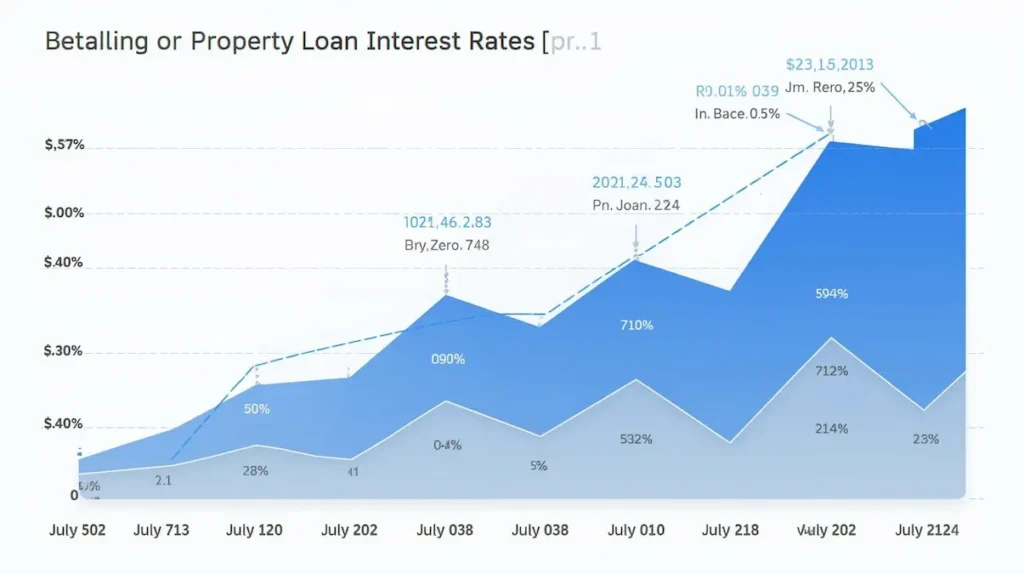In today’s ever-evolving financial landscape, the pursuit of financial freedom is a goal many strive for but few achieve. If you’re considering leveraging your assets to unlock new possibilities, a loan against property in Yamunanagar may be your key to financial empowerment. This powerful financial tool allows you to tap into the equity of your property, providing you with the necessary funds to invest in your dreams, be it expanding your business, funding education, or even managing unforeseen expenses. However, navigating the intricacies of property loans can feel overwhelming without the right guidance. In this ultimate guide, we’ll demystify the process, from eligibility criteria and documentation to the benefits and potential risks associated with property loans. Join us as we embark on this journey toward unlocking your financial freedom and making informed decisions that can transform your life.
Understanding Loan Against Property
A loan against property (LAP) is a secured loan where you pledge your property as collateral to obtain funds from a financial institution. This type of loan allows you to leverage the equity built up in your property, providing you with a substantial amount of money that can be used for various purposes. Unlike personal loans, which typically have higher interest rates and shorter repayment periods, loans against property generally offer lower interest rates and longer tenures, making them an attractive option for borrowers in need of significant funds.
The process of obtaining a loan against property involves several steps, including determining the value of your property, assessing your eligibility, and submitting the necessary documentation. The loan amount you can receive is usually a percentage of the property’s market value, commonly ranging from 50% to 70%. This percentage can vary depending on the lender’s policies and the type of property being pledged. Residential properties, commercial properties, and even land can be used as collateral for a loan against property.
One of the key advantages of a loan against property is its versatility. Whether you need funds for business expansion, higher education, medical emergencies, or even home renovations, a loan against property can cater to a wide range of financial needs. This flexibility makes it an appealing option for many borrowers who want to put their property to productive use without selling it.
Benefits of Taking a Loan Against Property

Taking a loan against property comes with several benefits that make it a preferred choice for many borrowers. One of the most significant advantages is the lower interest rate compared to other types of loans. Since the loan is secured by your property, lenders are exposed to lower risk, which translates into more favorable interest rates for borrowers. This can result in substantial savings over the loan tenure, making it a cost-effective financing option.
Another benefit is the higher loan amount you can obtain. Because the loan is backed by the value of your property, lenders are often willing to offer larger sums compared to unsecured loans. This can be particularly useful for big-ticket expenses such as business investments, purchasing additional property, or funding overseas education. The ability to access a significant amount of money can provide you with the financial leverage needed to achieve your goals.
The extended repayment tenure is also a notable advantage of loans against property. Unlike personal loans or credit cards, which typically have shorter repayment periods, loans against property can be repaid over a longer duration, often ranging from 10 to 20 years. This extended tenure reduces the burden of monthly installments, making it easier to manage your finances. Additionally, the longer repayment period provides you with the flexibility to plan your finances more effectively and ensure timely repayment without straining your budget.
Eligibility Criteria for Loan Against Property in Yamunanagar
Before applying for a loan against property in Yamunanagar, it’s crucial to understand the eligibility criteria set by lenders. While the specific requirements can vary from one lender to another, there are some common factors that most financial institutions consider when evaluating your loan application. Meeting these criteria increases your chances of approval and ensures a smoother application process.
Firstly, lenders will assess your age, as it plays a significant role in determining your eligibility for a loan against property. Typically, applicants need to be between 21 and 65 years old. Younger applicants may have a longer repayment horizon, while older applicants may face restrictions based on the loan tenure and their retirement age. It’s important to check the age criteria of your chosen lender to ensure you qualify.
Your income and employment stability are also critical factors. Lenders prefer applicants with a stable source of income, whether you are a salaried employee or a self-employed individual. For salaried employees, lenders may require proof of employment and income through salary slips, bank statements, and employment letters. Self-employed individuals may need to provide financial statements, income tax returns, and business continuity proof. A consistent income stream reassures lenders of your ability to repay the loan.
Additionally, the value and type of property you intend to pledge as collateral are crucial determinants of loan eligibility. Lenders will evaluate the property’s market value, location, condition, and legal status. Properties with clear titles, good resale value, and favorable locations are more likely to be accepted as collateral. The loan amount offered will generally be a percentage of the property’s value, so it’s essential to have an accurate assessment of your property’s worth before applying.
Documentation Required for Loan Against Property
When applying for a loan against property, having the right documentation is essential to ensure a smooth and efficient process. Lenders require various documents to verify your identity, income, property details, and other relevant information. Being prepared with all necessary documents can expedite your loan approval and disbursement.
Firstly, identity and address proof documents are mandatory. Commonly accepted identity proofs include Aadhar card, PAN card, passport, voter ID, and driving license. For address proof, you can provide utility bills, rental agreements, or any government-issued document that includes your current address. These documents are crucial for verifying your personal details and establishing your credibility as a borrower.
Income proof is another critical requirement. For salaried individuals, this typically includes recent salary slips, bank statements for the last six months, and Form 16 or income tax returns. Self-employed individuals may need to submit financial statements, bank statements, income tax returns for the past few years, and proof of business continuity. These documents help lenders assess your repayment capacity and ensure you have a stable source of income to support the loan.
Property-related documents are also essential when applying for a loan against property. This includes the property’s title deed, sale agreement, property tax receipts, and any other documents that establish ownership and legal status. Lenders will conduct a thorough evaluation of the property to determine its market value and suitability as collateral. Ensuring that your property documents are complete and accurate can prevent delays and complications in the loan approval process.
How to Choose the Right Lender
Choosing the right lender for your loan against property is a crucial decision that can significantly impact your borrowing experience. With numerous banks and financial institutions offering property loans, it’s essential to compare different lenders based on various factors to find the best fit for your needs. Here are some key considerations to keep in mind when selecting a lender.
Interest rates and loan terms are among the most important factors to consider. Different lenders offer varying interest rates and loan tenures, which can affect your overall repayment amount. It’s advisable to shop around and compare interest rates from multiple lenders to find the most competitive rate. Additionally, consider the loan tenure offered and choose a lender that provides a flexible repayment period that aligns with your financial goals.
Customer service and support are also critical when choosing a lender. A lender with a reputation for excellent customer service can make the loan process more pleasant and less stressful. Look for lenders that offer dedicated customer support, easy access to information, and a willingness to assist with any queries or concerns. Reading customer reviews and testimonials can provide insights into the lender’s service quality and reliability.
Another important consideration is the lender’s processing fees and charges. Apart from the interest rate, lenders may impose various fees such as processing fees, legal fees, valuation charges, and prepayment penalties. These additional costs can add up and impact the overall cost of your loan. It’s essential to understand all the fees involved and choose a lender with transparent and reasonable charges. By carefully evaluating these factors, you can select a lender that offers the best terms and support for your loan against property.
The Application Process for Loan Against Property
The application process for a loan against property involves several steps, from gathering documents to submitting the application and awaiting approval. Understanding each step can help you navigate the process more efficiently and increase your chances of a successful loan application.
The first step is to assess your eligibility and gather the necessary documents. As mentioned earlier, you’ll need to provide identity proof, address proof, income proof, and property-related documents. Having all these documents ready in advance can expedite the application process and prevent delays. It’s also advisable to get a professional valuation of your property to determine its market value, as this will impact the loan amount you can receive.
Once you have all the required documents, you can submit your loan application to the chosen lender. This can usually be done online or in person at the lender’s branch. The application form will require you to provide details about yourself, your property, and the loan amount you are seeking. Ensure that you fill out the form accurately and completely to avoid any issues during the processing stage.
After submitting your application, the lender will conduct a thorough review of your documents and evaluate your property. This may involve a physical inspection of the property and verification of its legal status. The lender will also assess your creditworthiness, income stability, and repayment capacity. If everything is in order, the lender will approve your loan and disburse the funds. It’s important to stay in touch with the lender during this period and provide any additional information or documents if requested.
Interest Rates and Charges: What to Expect

Understanding the interest rates and charges associated with a loan against property is crucial for making an informed borrowing decision. Interest rates can significantly impact the total cost of your loan, so it’s essential to know what to expect and how to find the best rates.
Interest rates for loans against property are generally lower than those for unsecured loans due to the secured nature of the loan. However, the exact rate you receive will depend on various factors, including the lender’s policies, your credit score, the loan amount, and the repayment tenure. It’s advisable to compare interest rates from different lenders to find the most competitive offer. Some lenders may offer fixed interest rates, while others may provide floating rates that fluctuate based on market conditions.
In addition to the interest rate, there are several other charges you need to be aware of. Processing fees are a common charge that lenders impose for processing your loan application. This fee is usually a percentage of the loan amount and can vary from lender to lender. Other charges may include legal fees, valuation charges, and administrative fees. It’s important to get a clear understanding of all the fees involved and factor them into your overall cost calculations.
Prepayment and foreclosure charges are also important considerations. Some lenders may allow you to prepay or foreclose your loan before the end of the tenure, but they may impose penalties for doing so. These charges can vary depending on the terms and conditions of the loan agreement. Understanding these charges can help you plan your repayment strategy effectively and avoid any unexpected costs.
Tips for Managing Your Loan Effectively
Managing your loan against property effectively is essential to ensure timely repayments and avoid financial stress. Proper loan management can help you maintain a good credit score and prevent any negative impact on your financial health. Here are some tips to help you manage your loan effectively.
Firstly, create a detailed repayment plan. Understand your monthly installment amount and ensure that it fits within your budget. It’s important to prioritize your loan repayments and allocate sufficient funds each month to meet your obligations. Setting up automatic payments can help you stay on track and avoid missing any due dates. Additionally, consider creating an emergency fund to cover any unexpected expenses that may arise during the loan tenure.
Secondly, monitor your loan account regularly. Keep track of your repayment schedule, outstanding balance, and any changes in interest rates or charges. Regularly reviewing your loan account can help you stay informed and address any issues promptly. If you notice any discrepancies or have any concerns, don’t hesitate to contact your lender for clarification and assistance.
Another important tip is to explore prepayment options. If you have surplus funds or receive a windfall, consider making prepayments towards your loan. Prepaying a portion of your loan can reduce your outstanding balance and save you interest costs over the loan tenure. However, be aware of any prepayment charges that may apply and factor them into your decision. By managing your loan effectively, you can ensure a smooth repayment process and achieve your financial goals.
Common Misconceptions about Loans Against Property
There are several common misconceptions about loans against property that can deter potential borrowers from considering this financing option. Dispelling these myths can help you make an informed decision and understand the true benefits and risks associated with loans against property.
One common misconception is that you risk losing your property if you take a loan against it. While it’s true that the property is used as collateral, lenders typically do not resort to foreclosure unless there is a significant default on the loan. As long as you make timely repayments and adhere to the loan terms, the risk of losing your property is minimal. It’s important to choose a reputable lender and ensure that you can comfortably manage the loan repayments to mitigate this risk.
Another misconception is that loans against property are only suitable for business purposes. While these loans are indeed popular among business owners for funding expansions and investments, they can be used for a variety of purposes. Whether you need funds for higher education, medical emergencies, home renovations, or debt consolidation, a loan against property can provide the financial support you need. The versatility of this loan makes it a valuable option for various financial needs.
Some people also believe that the application process for a loan against property is overly complex and time-consuming. While it does involve several steps and documentation, a well-prepared application can streamline the process. Understanding the requirements, gathering the necessary documents, and choosing a lender with efficient processing can make the application process smooth and hassle-free. By dispelling these misconceptions, you can confidently explore the benefits of a loan against property and make an informed borrowing decision.
Conclusion: Taking the Next Steps Towards Financial Freedom
Unlocking financial freedom through a loan against property in Yamunanagar is a viable and empowering option for many borrowers. By leveraging the equity in your property, you can access substantial funds at competitive interest rates and flexible repayment terms. Whether you need to expand your business, fund education, manage medical expenses, or achieve other financial goals, a loan against property can provide the support you need.
Understanding the eligibility criteria, documentation requirements, and the application process is crucial for a successful loan application. Choosing the right lender and being aware of the interest rates and charges can help you make an informed decision and find the best loan terms. Additionally, effective loan management and dispelling common misconceptions can ensure a smooth repayment process and prevent financial stress.
As you embark on your journey towards financial freedom, it’s important to stay informed and seek professional advice if needed. By making informed decisions and leveraging the benefits of a loan against property, you can unlock new possibilities and achieve your financial aspirations. Whether you are a seasoned borrower or a first-time applicant, this ultimate guide provides you with the knowledge and insights to navigate the world of property loans with confidence.
